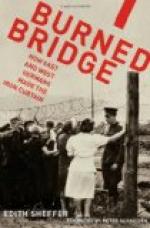* * * * *
There will be those who, having followed so far, will desire further light. They will ask naively: Did Wes Thompson go back to the front and get killed? Did they marry and find lasting happiness?
To these curious folk who seek explicit detail, I can only point out that Wes Thompson had three months’ leave which ran into November, and that to Sophie that ninety days loomed like a stay of execution. I would ask them further to recall the eleventh of November, 1918—and so the first question is duly answered.
As for the second—I am no soothsayer. I cannot foretell the future. Most certainly they married. At once—with a haste prudery and lovers of formalism might term indecent.
Whether they live happily who can say? Somewhere between the day he first looked on Sophie Carr at Lone Moose and the day he fell five thousand feet to earth in a flaming battle-plane, keeping his life by one of war’s miracles, Wes Thompson lived and loved and suffered perhaps a little more than falls to the common lot. He sloughed off prejudices and cant and ignorance and narrowness in those six years as a tree sheds its foliage in autumn.
A man may come to doubt the omnipotence of God without denying his Maker. He may scorn churchly creeds and cleave to the Golden Rule. He may hate greed and oppression, and injustice and intolerance, and ruthless exploitation of man by man—and still hold firm faith in humanity, still yearn to love his neighbor as himself.
To do good, to fight hard and play fair, to love faithfully and to desire love, to go out of the world when his time should come with the knowledge of having at least tried to make it a little better for those who were in it, and for those who should come after. That was Wes Thompson’s working philosophy of life—if he might be said to have a philosophy—although he certainly never formulated it in words.
He married a woman whom he loved dearly, who loved him, was proud of him, who saw life as he did—through tolerant, comprehending eyes. So if you ask whether they found real and lasting happiness I can only cite you bald facts. I cannot prophesy. But I wish my chances were as good.
THE END
* * * * * *
THE NOVELS OF TEMPLE BAILEY
May be had wherever books are sold. Ask for Grosset & Dunlap’s list.
THE BLUE WINDOW
The heroine, Hildegarde, finds herself transplanted from the middle western farm to the gay social whirl of the East. She is almost swept off her feet, but in the end she proves true blue.
PEACOCK FEATHERS
The eternal conflict between wealth and love. Jerry, the idealist who is poor, loves Mimi, a beautiful, spoiled society girl.




